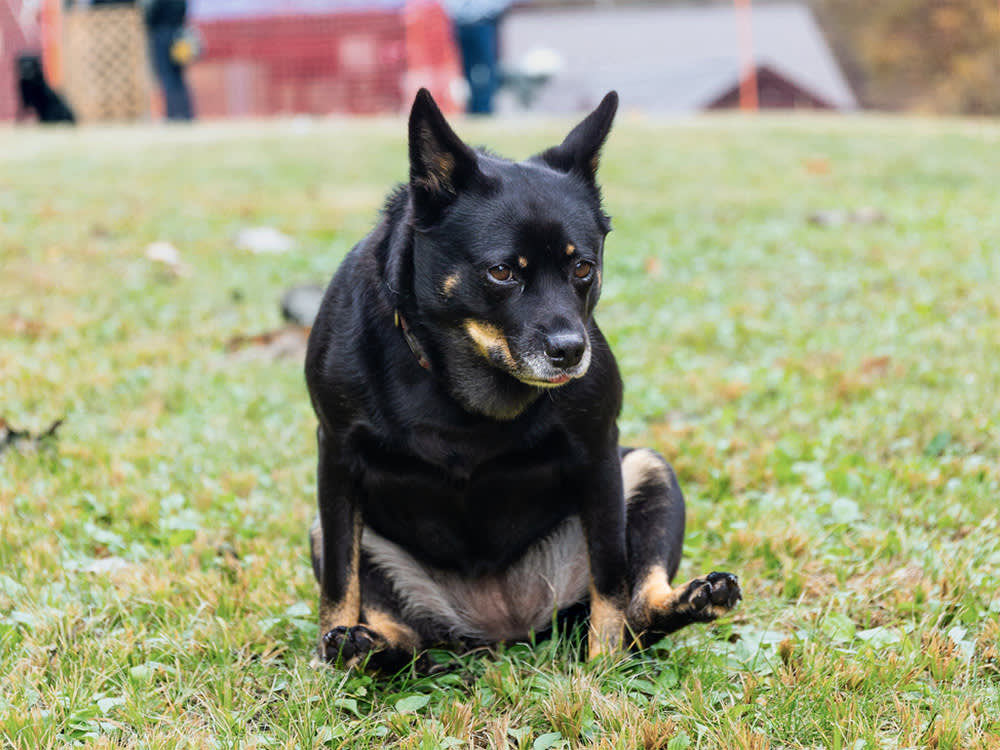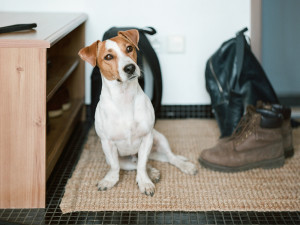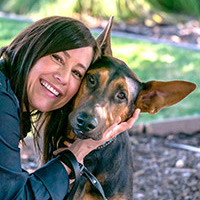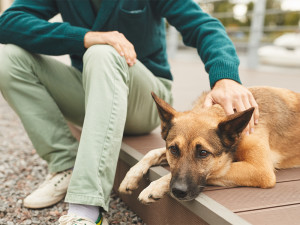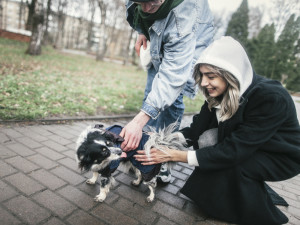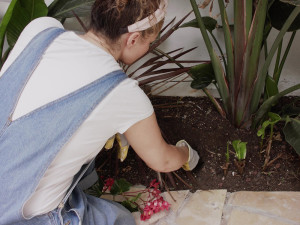Home Remedies For Dog Scooting
A vet on what to do when “anal sacs go bad.”
In This Article:
What Is Dog Scooting? Best Home Remedies for Dog Scooting When Should I Stop Using Home Remedies and Consult a Vet? Frequently Asked Questions
When it comes to gross behaviors, your dog scooting their butt across the floor (or on your new rug), definitely tops the list. It may seem funny or weird, but scooting is no laughing matter — in fact, it’s usually a sign of an issue with their digestive system, anal glands, skin, or something else. Before you try to remedy your dog’s scooting at home, get a veterinarian’s diagnosis.
What is dog scooting?
Dog scooting is when your dog drags their butt across the floor. It’s a common behavior that can be caused by a variety of medical and behavioral issues. If your dog is scooting, it’s important to take them to the veterinarian to rule out any medical problems. Once any medical issues have been addressed, you can work with your vet to develop a plan to prevent your dog from scooting.
Why do dogs scoot?
There are a few common reasons dogs scoot, including:
How much do you spend on your pet per year?
Anal gland issues: These little scent glands live just inside the rectum and produce a thick secretion that coats each bowel movement, putting your dog’s personal “scent stamp” on their feces. They can become impacted or infected, both causing pressure inside your dog’s rectum, making them scoot as a way to relieve that pressure.
Digestive issues: Diarrhea, constipation, intestinal worms, infections, or tumors can all cause irritation that leads to scooting.
Skin issues: The skin around the anus and genitals can be very susceptible to irritation. Matting of the hair, frequent moisture, or an overload of bacteria or yeast can cause skin issues that make a dog scoot.
Behavioral issues: Dogs experiencing stress, anxiety, or another behavioral issue may scoot as the repetitive motion can be soothing.
Best home remedies for dog scooting
There are steps you can take at home to help your pup feel better and prevent ongoing scooting. In part, it depends on what is causing them to scoot in the first place. Preventative measures and treatments are aimed at addressing these underlying conditions and helping your dog find some relief.
Warm-water compress
You can take a washcloth or paper towel and soak it in warm water and then apply the warm compress directly to your dog’s hind end. Make sure that the water is not too hot and test the temperature on the inside of your elbow first.
Try to hold the compress in place for at least 10 minutes to maximize the benefits. A warm compress helps to enlarge blood vessels near the surface of the skin, increasing circulation, reducing swelling, and recruiting other important cells to the area. It may also help to soften any plugs or crusts that could be blocking the opening of the anal gland ducts. If you see an open wound, skip the warm compress as this area may be too painful to be touched, and see your vet right away.
Anal gland expression
Be aware that anal gland expression can get a little graphic. It involves milking the anal glands either internally or from the outside to relieve the blockage. Most dog parents gladly pass this job off to their groomer or veterinarian, but it can be something you do at home, especially after getting directions from your vet.
Regular grooming
Grooming your dog should be considered a regular part of their healthcare. Brushing or combing helps to remove excess hair and reduce tangles or mats that could be causing skin irritation. Special attention needs to be paid to the genital region to prevent dirtiness or tangles that could cause a dog to scoot.
Probiotics and prebiotics
Healthy digestion is important for so many reasons, including keeping a dog from scooting. Providing your dog with probiotics and prebiotics helps to ensure that the delicate gut maintains a healthy balance to promote regular digestion that can prevent things such as diarrhea and constipation.
Calendula compresses
Calendula is an extract from the marigold flower that is thought to help heal wounds. Calendula may be soothing for a dog’s anus if they are irritated from scooting a lot. The dried flowers can be steeped into a tea and then that liquid is diluted and used for compressing. If you notice your dog has an open wound or is actively bleeding, be sure to see your vet right away and skip the compress; this area may be very painful to the touch.
Diet or more fiber
Because some dogs scoot from impacted anal glands due to chronic soft stool or diarrhea, increasing your pup’s fiber intake may help those cases. In theory, if you can help firm up your dog’s poop, they should be able to compress the glands and empty them with each bowel movement. In most cases, fiber is a safe addition to your dog’s diet, so it is unlikely to make things worse, even if it doesn’t stop the scooting.
Some good sources of fiber for your pup include fruits and veggies like sliced apple with the skin on, pumpkin, broccoli, kale, and sweet potato. If your vet feels that your dog needs a much higher fiber intake, they may recommend specific supplements and/or specialized diets so be sure to discuss this with your vet. Make sure to introduce fiber slowly in small amounts so your dog has time to adjust. A sudden increase in fiber in their diet can cause gas, bloating, and even diarrhea, so go slow.
Omega-3 fatty acids
Omega-3 fatty acids are all the rage, touted to help with nearly every malady known to dogs. That can even include scooting. Omega-3 fatty acids act as natural anti-inflammatories, potentially helping decrease itchiness associated with skin and other issues that could lead to scooting.
Soothing baths
For many dogs with itchy, red, or inflamed skin, or even fur that may be matted with poop, a soothing bath is often a good first step. Use warm but (not hot) water and consider purchasing a soothing shampoo made specifically for dogs, like an oat-based product, or ask your veterinarian for a recommendation based on your dog’s specific needs.
When should I stop using home remedies and consult a vet?
It’s best to consult your vet before starting the home remedies listed above. This will help you get a clear diagnosis of why your pet is scooting. In some cases, there may be a more specific treatment that your pup needs to resolve the problem or a more serious condition that needs to be addressed right away.
In other cases, once your vet helps you figure out the underlying cause, you can better tailor your home remedies to your pup’s needs. And certainly, if you see that your pup seems to be in pain, has any open or bleeding wounds, or has other signs of illness including decreased appetite, lethargy, vomiting, diarrhea, difficulty breathing, or anything else that has you worried, see your vet right away.
FAQs
Can home remedies replace veterinary care for scooting?
No. There is always an underlying cause that needs to be addressed to properly treat scooting. Home remedies provide temporary relief in combination with vet care.
Is coconut oil effective for dog scooting?
No. Coconut oil has no effect on scooting and can put dogs at risk for digestive upset and pancreatitis if they ingest the oil.
Does pumpkin help dog scooting?
Pumpkin can be a great source of fiber that your dog will actually like, and as we have learned, increasing a dog’s fiber intake can help with scooting by promoting the natural expression of the anal glands. If your vet advises you to increase fiber to address your dog’s scooting, you can feed plain pumpkin, not pumpkin pie filling.
Can you use over-the-counter creams for your dog’s scooting?
In most cases, over-the-counter creams will not help your dog’s scooting and some human products are toxic to dogs. Unless you are using a cream recommended by your vet, do not use these products.
References
Collins, Brian. “Anal Sac Diseases.” Cornell University College of Veterinary Medicine, 1 Mar. 2023, www.vet.cornell.edu/departments-centers-and-institutes/riney-canine-health-center/canine-health-information/anal-sac-diseases.opens in new tab
Medicine, Purdue Veterinary. “Pet Health Tips: Dogs.” Purdue University College of Veterinary Medicine, vet.purdue.edu/hospital/small-animal/primary-care/tips/dog-tips.phpopens in new tab.
“Role of Omega-3 Fatty Acids in Canine Health: A Review.” International Journal of Current Microbiology and Applied Sciences. 3 Nov 2020. https://www.ijcmas.com/9-3-2020/Haneet%20Kaur,%20et%20al.pdfopens in new tab.
